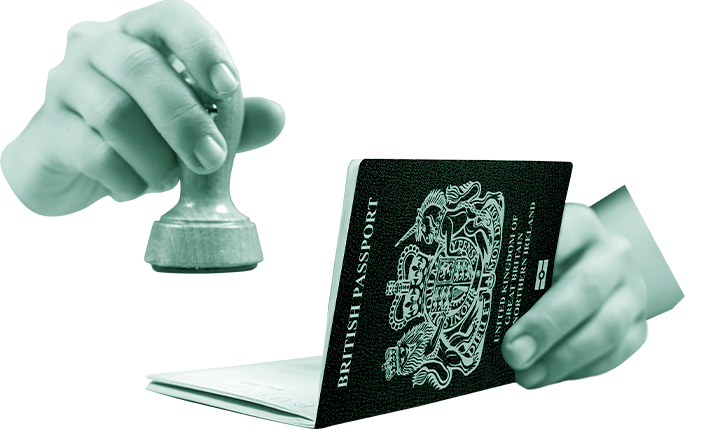Let's Talk

Need Help Urgently?
Call our 24 hour rapid response team now on 0333 311 1090
Request a callback
"*" indicates required fields


The UK Service Supplier visa allows foreign professionals to work with UK businesses. This includes both those who work for service providers outside the UK and independent contractors. It is part of the Global Business Mobility setup. This visa makes it easier for people doing temporary jobs to come to the UK. With this process, international companies can use skilled workers and build strong business relationships.
The UK Service Supplier visa is meant for professionals who work for companies in the UK. It is part of the Global Business Mobility category. This visa helps make it easier for people to take on international work assignments. It is for individuals who work for service providers from other countries and for freelance workers outside the UK.
This visa is especially appealing because it is quite flexible. It mainly focuses on work with the sponsoring company. However, it also lets you grow personally and professionally. Those with the visa can do voluntary work and continue their studies. This gives them a richer experience while in the UK.
The service supplier visa is part of the UK immigration system. It allows foreign workers to do temporary jobs for UK companies. This visa is specifically for people giving services under a valid international trade agreement.
It helps skilled workers play a role in the UK economy in a clear way. The visa shows how important international trade agreements are for building business partnerships and boosting economic growth.
By giving out this visa, the UK shows it is serious about trade agreements. It promotes sharing of knowledge and skills, which helps create a lively and connected work environment around the world.

The UK service supplier visa is important for global business mobility. It helps UK companies find skilled service suppliers from around the world. These experts can support their operations and projects.
This visa is backed by international trade agreements. It shows that the UK wants to build strong business partnerships across the globe. By making it easier for specialized professionals to work in the UK, the visa creates smooth cross-border service delivery.
This plan helps UK businesses and boosts global partnerships. It encourages economic growth and new ideas by allowing the sharing of skills and knowledge.
To apply for a UK service supplier visa, you need to meet specific requirements. One important requirement is having a contract to provide services to a UK company. This can be as an employee of an overseas company or as a self-employed professional living outside the UK.
The contract must fit within a valid international trade agreement. This means that your job and the agreement with the UK company must match the rules stated in a recognized international trade agreement. Only then can you qualify for this service supplier visa.
The service supplier visa relies on an important rule. The work contract must be approved by a valid international trade agreement. This means that the services provided by the applicant, whether they are a professional or a company representative, must match the trade relations set by the UK and another country.
This strict rule makes sure that the visa helps with trade and economic exchange according to the agreements made. Applicants must show that their work connects directly to the terms in the specific international trade agreement that they are applying for.
They may need to provide clear details about the type of work, the industry they are in, and the trade activities that the agreement includes.
Securing a UK Service Supplier visa needs sponsorship from a UK-based company with a valid sponsor licence. This licence shows that the Home Office has approved the company to meet its sponsorship duties. These duties include following immigration rules and upholding job standards.
A key part of sponsorship is the Certificate of Sponsorship given to the applicant. This certificate has important information about the job, like the role, salary, and how long the work will last. The UK sponsor is responsible for making sure the applicant meets all needed criteria. They must also ensure the job offered matches the conditions of the sponsor licence.
This sponsorship system is important. It helps keep the visa process fair and protects the interests of both the applicant and the UK job market.
Not every job is eligible for the UK Service Supplier visa. The UK government has a detailed list of jobs that are allowed. These jobs are sorted by specific occupation codes. To be considered for a visa, applicants need to make sure their job matches one of these occupation codes.
Different job sectors have their own requirements. Applicants may need to show they have relevant work experience, specific qualifications, or certifications. It is important to understand the detailed requirements for each industry to boost the chances of a successful application.
Navigating the UK Service Supplier visa application involves understanding whether your profession is recognized under this category. The Home Office provides a comprehensive list of eligible occupations, each associated with a unique occupation code.
This list outlines specific job roles and their corresponding codes, providing clarity on acceptable professions under this visa route. Applicants should identify their occupation code and ensure its inclusion on the list before proceeding with the application.
Below is an example of how eligible occupations are presented:
| Occupation Code | Job Type | Related Job Titles |
| 2139 | IT Specialist | Software Developer, Systems Analyst, Database Administrator |
| 2442 | Marketing Professional | Marketing Manager, Digital Marketing Executive, Market Research Analyst |
Ensure your profession aligns with these classifications for a smoother application journey.
While having a suitable job is important, getting the UK Service Supplier visa may need more than that. It often has extra rules depending on the job sector. Applicants should pay attention to these specific needs to make sure their application matches the set standards.
Some sectors may require certain skills or professional certificates, especially in areas like engineering, healthcare, and finance. Showing proof of these qualifications, such as recognized certificates, diplomas, or licenses, is very important to show skills.
Also, even if a job is usually accepted, some sectors may ask for a minimum amount of professional experience. This helps to make sure that applicants have the skills and knowledge needed to effectively work in the UK service sector.


To apply for a UK Service Supplier visa, you must submit your application online at the official Gov.uk website. A key part of this process is getting a Certificate of Sponsorship. This certificate shows that a UK company wants to hire you for the job.
During the application, you need to give documents that can be verified. This includes proof of who you are, your work history, your qualifications, and your financial situation. These documents are essential for your application. They show that you meet the visa requirements.
Navigating the UK Service Supplier visa application process is easy when you follow a clear plan.
A successful UK service supplier visa application depends a lot on providing complete and clear documents. You need to include a valid passport. The passport must have at least six months left before it expires. It helps show who you are and your nationality.
You also need to prove you can support yourself financially. This proof often comes from bank statements that show you have enough money for your stay in the UK. What financial documents you need might change based on your situation and any sponsorship agreements.
Furthermore, be ready to show evidence of your professional experience. This can be things like job contracts, letters of recommendation from past employers, or other papers that support your work history and skills in your field.
Applicants for a UK Service Supplier visa need to show they have enough money to support themselves while they are in the country. This often means giving bank statements to prove they have the funds to pay for living costs.
The visa process also includes some fees. These fees consist of an application fee and, if needed, an immigration health surcharge. This surcharge allows access to the UK’s National Health Service. Keep in mind that these fees can change, so applicants should check the official UK government website for the latest information.
When you apply for the UK Service Supplier visa, it is important to know about the fees. There is a fee for the visa application, and you pay it online when you submit your application. This fee helps cover the costs of processing your application.
Besides the application fee, you usually have to pay the Immigration Health Surcharge. This charge helps you get healthcare services from the UK’s National Health Service (NHS) while you are there. The amount of the surcharge can change based on how long your visa lasts.
Remember, these fees can change, so it is a good idea to check the official UK Visas and Immigration website. That way, you can get the latest information on fees and how to pay them.
A key part of the UK Service Supplier visa application is showing that you have enough money. This is important because it tells the Home Office that you can take care of yourself without needing public funds while you are in the UK.
Usually, you need to show a set amount of money in your bank account for a certain period. This money has to be available for your own costs, which shows you are really financially independent.
If your sponsor agrees to pay for your living costs for the first month, you may not need to show this money. But this agreement must be clearly included in your application.
The UK Service Supplier visa usually lasts as long as the job contract says. There is a maximum time based on the trade agreement. This time can be from a few months to a couple of years. It all depends on the service agreement details.
If you need to stay longer than the visa’s initial time, you can apply for an extension. To get an extension, you must still meet the rules and conditions of the visa. This means you need to plan carefully and follow immigration rules.


The initial length of a UK Service Supplier visa usually matches the time in the job contract you show when you apply. But, there is often a limit on how long you can stay. This limit depends on the international trade agreement related to the visa.
This visa type is for temporary work assignments, but it is important to remember that it does not lead directly to indefinite leave to remain in the UK.
If people want to stay longer than the original visa period or look for ways to settle, they must think about other visa types and check their eligibility criteria.
Extending your stay in the UK with a Service Supplier visa requires following certain steps and meeting specific needs. You must submit an extension application to UK Visas and Immigration (UKVI) before your current visa expires. This helps you stay legally without any issues.
It is important to show that you still meet the requirements for the extension. You need to provide proof of your ongoing work with the same sponsoring company. This includes keeping a valid employment contract and meeting the financial requirements set by the rules.
Being compliant with UK immigration rules is very important during this process. You must stick to the terms of your visa. For example, you should not take part in any activities that are not allowed. This is key for getting a positive result.
The UK Service Supplier visa lets eligible applicants bring their family members, like partners or children, to the UK. But, there are specific rules and requirements. Dependents must meet certain conditions based on their relationship with the main applicant and also show they have enough money.
Each dependent needs a separate application. This application should be sent along with the main visa application. Adding dependents can change how long the application takes to process. So, it is important to plan well and follow the required documents carefully.
Bringing dependents to the UK with a service supplier visa needs careful steps. First, we need to understand who counts as a ‘dependent’. This usually means spouses or partners who are legally married, in a civil partnership, or in a serious relationship with the main applicant. It also includes children under 18 years old.
It is important to show that these relationships are real and ongoing. You can do this by providing documents like marriage certificates, birth certificates for children, and proof of living together or sharing financial duties.
Dependents must meet financial needs. They need to show they can take care of themselves without using public funds while in the UK. This usually means having enough money in their bank accounts or showing that the main applicant can financially support them.
Including dependents on a service supplier visa application can make the process more complex and take more time. When you submit dependent visa applications with the main applicant’s visa, you will need to provide extra paperwork and go through more checks. This could increase the overall processing time.
Applicants should be aware of this possible delay. It is important to submit all required documents for both the main and dependent visa applications on time. If you do not provide complete and accurate information for all applicants, it can really slow down processing times.
Also, the decision time for dependent visas often depends on the primary applicant’s visa. You should know that the main applicant’s visa decision usually comes first. This highlights the need for a well-prepared and carefully submitted application.
To get a Global Business Mobility – Service Supplier Visa, you need to meet certain requirements. You must be at least 18 years old and work for an overseas service provider that will supply services to your UK sponsor. You also need to show you have worked for that overseas service provider for at least 12 months outside of the UK.
Additional requirements are: a valid contract between your UK sponsor and the overseas service provider registered with the Home Office, a valid Certificate of Sponsorship from your UK sponsor, and proof that the job is real and at the right skill level. You should be ready to show you have enough money, a valid TB certificate if needed, and meet specific nationality rules based on the trade agreements that apply.


A key part of the Global Business Mobility – Service Supplier Visa is the need for overseas work. To qualify, people must show they have worked with an overseas service provider outside the UK for at least 12 months.
This 12-month work time doesn’t need to be right before applying. It can be over any time period, proving an ongoing work connection with the supplier. However, if there are gaps in this time, they need to be explained. Acceptable explanations include taking time off for maternity, paternity, parental, or adoption leave, sick leave, helping during humanitarian crises, or being part of legal industrial action.
A key requirement for the Global Business Mobility – Service Supplier Visa is a valid contract. The UK sponsor must have a formal agreement with the overseas service provider. This contract is not just a formality; it is crucial for the visa application. It also needs to be registered with the Home Office.
This registration process helps ensure transparency and legitimacy. It shows authorities that the applicant’s presence is linked to real business needs. The contract must clearly spell out the scope of services. It should also show how these services relate to the applicant’s skills and the sponsor’s business operations.
To get a UK Service Supplier Visa under the global business mobility scheme, you need a Certificate of Sponsorship (CoS). The CoS is a document from a UK sponsor. It shows that you meet the requirements to be a service supplier. It confirms that a UK company is ready to sponsor your visa application. You must meet certain criteria, such as having the right qualifications and professional experience in your occupation code. Having a valid CoS is very important for a smooth visa application process and for following immigration rules.
A Certificate of Sponsorship (CoS) is very important. However, it is just as important that the job offer linked to it is real. The Home Office reviews applications to make sure that the job is not fake and does not exist just for a visa.
They check things like whether the job is truly needed in the sponsor’s business. They also look at the applicant’s skills and experience. If there is any sign that the job is a made-up one or if the role is shown untruthfully, the application may be rejected.
It is essential to show a genuine job need. This means being clear and honest during the application process. Sponsors need to prove that the job is necessary for their business. Likewise, applicants should really want to use their skills for the job mentioned in the CoS.
The Global Business Mobility – Service Supplier Visa needs the job to be skilled at a certain level. This rule makes sure that people coming to the UK with this visa have valuable skills that help the economy.
The job usually must be skilled to at least RQF Level 6, which is around a graduate level. You don’t always need a degree, but the job should match the skill and complexity of a graduate-level role. Applicants should check the official list of eligible occupations and codes to confirm their job’s status.
Unlike some other UK work visas, the Global Business Mobility – Service Supplier Visa has no strict minimum salary. This gives sponsors and applicants flexibility, especially for short-term projects where salary expectations may vary.
Even though there isn’t a set amount, the salary offered should still meet industry standards. It should allow the applicant to cover their living costs in the UK. It’s also important to note that the financial requirement is still important. This shows that the person can handle their finances on their own.

To qualify for the Global Business Mobility – Service Supplier Visa, your nationality is very important. It is directly tied to the trade agreement you are applying under. You need to be a citizen of the country where the overseas service provider is located.
There can be some exceptions based on the trade agreements. In some cases, holding permanent residency in the country of the overseas service provider may be enough. You should look closely at the specific terms in the trade agreement to check if you qualify.
One benefit of the Global Business Mobility – Service Supplier Visa is that employers do not have to pay the Immigration Skills Charge. This charge usually applies to many other work visa types. It is meant for sponsors to help train and develop local workers.
The exemption for Service Supplier sponsors recognizes that these jobs are temporary. It helps ease the financial strain on UK companies that want to use this visa for short-term projects or to fill skill gaps in their teams.
Showing that you are financially stable is important for a Global Business Mobility – Service Supplier Visa. This rule makes sure applicants can take care of themselves without using public funds while they are in the country. Usually, applicants need to show they have access to a specific amount of cash saved for several months to pay for their living expenses.
There are some exceptions to this rule. If the sponsor is ready and able to pay for the applicant’s living costs for the first month, the financial requirement may be removed. This agreement must be clearly stated and included in the application, often in the Certificate of Sponsorship.
The UK has many strict rules for its visas. However, the Global Business Mobility – Service Supplier Visa is different. It does not require a formal English language test. This shows that people applying often have special skills and experience, which means they likely have good communication skills.
Still, good communication is very important for success at work. Even though proving your English skills is not required, showing them through your education, work experience, or other certificates can help your application. It shows you are ready to work in a UK business setting.

Switching to a Global Business Mobility – Service Supplier Visa is an option for people already living in the UK. This visa offers flexibility for those who want to change their immigration status to find new work opportunities.
However, not all visa types allow direct switching. Short-term visas, like the Standard Visitor visa, Student visa, or Parent of a Child Student visa, do not allow it. If you are on one of these visas, you will need to go back to your home country. Then, you can apply for the Service Supplier visa from outside the UK.
The Global Business Mobility – Service Supplier visa usually allows a stay based on the trade agreement related to the work. This is typically either six or twelve months.
For service suppliers coming to the UK with this visa, the stay cannot be longer than what’s in their Certificate of Sponsorship (CoS) plus 14 days. This means that the visa will be valid for the shorter time between the maximum stay allowed by the trade agreement and what is noted in the CoS.

The Global Business Mobility routes make it easier for foreign workers to come and work in the UK. However, there are rules about how long someone can stay on these routes. Right now, the rules say that the total stay on any Global Business Mobility route, including the service supplier visa, cannot be more than five years in a rolling six-year period.
This rule helps ensure that these visas are for temporary work and not used as a way to stay in the UK permanently. If someone wants to stay in the UK for more than five years, they will need to look for other visa options that allow for longer stays and paths to settlement.
The Global Business Mobility – Service Supplier visa has rules about what the visa holder can do while they are in the country. Mainly, people can only work for the company that sponsored them and must follow the specific job listed on their Certificate of Sponsorship. They cannot work in any other job without permission from the Home Office.
Even with these work restrictions, visa holders have some room to grow. They can usually take courses to study or do voluntary work. These options allow them to learn new skills and help their community.
It’s important to know that the Global Business Mobility – Service Supplier visa does not lead directly to staying forever in the UK or getting indefinite leave. This visa supports temporary work assignments based on international trade agreements.
Even though you can’t settle directly, people on this visa can look for other options if they want to stay long-term. They may think about switching to different visa categories, like the Skilled Worker visa. This could fit their skills and career goals and could eventually lead to settlement opportunities.
One benefit of the Global Business Mobility – Service Supplier Visa is that it allows dependents to join. If you are successful, you can bring your spouse or partner and children under 18 to the UK.
However, your dependents must also meet some eligibility criteria. They need to show that they are financially stable. This means they should have enough money to support themselves without using public funds. They will also need to send in separate applications. These applications should be submitted with the main applicant’s visa. They must include all necessary documents, like proof of relationship.

UK businesses that want to hire overseas service suppliers must get a Global Business Mobility sponsor licence. To do this, the company has to show that it has a solid presence in the UK. They also need to explain why they need a specific skilled worker from abroad.
The application process includes meeting several requirements. The UK business must have strong HR systems to follow UK immigration laws. They must show they can handle sponsor responsibilities well. It is also important to appoint someone responsible to carefully manage the sponsorship process and keep accurate records.
Can I switch from another visa category to the Service Supplier Visa?
You can often switch from some UK visas, such as the Skilled Worker visa, to the Service Supplier visa if you meet the eligibility criteria. However, if you are on a visit visa or a short-term study visa, you usually have to go back to your home country. After that, you can apply for the visa from abroad.
What happens if my job role or employer changes while on a Service Supplier Visa?
Changing your job or employer while on a Service Supplier visa means you must update your visa with the Home Office. Usually, you will need a new Certificate of Sponsorship from your new employer. The job role must still meet the rules of the visa.
Are there any specific trade agreements that qualify for this visa category?
The Service Supplier visa depends on certain trade agreements between the UK and other countries. You can find a list of these trade agreements and the jobs that qualify for the visa on the UK government’s website.
We are always happy to talk about any legal concern you may have regarding criminal law matters.
Get In Touch

Call our 24 hour rapid response team now on 0333 311 1090
"*" indicates required fields
"*" indicates required fields